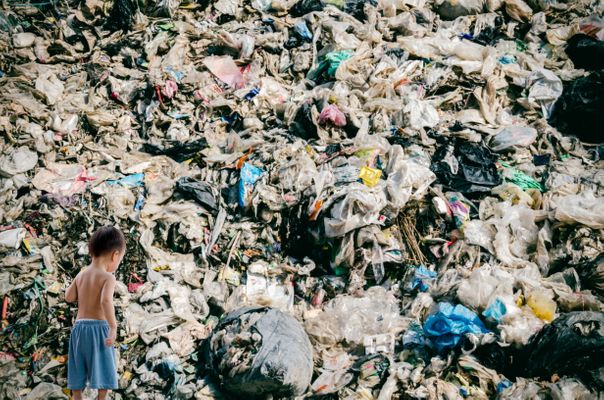5.1.6
Polymers: The Six R's
The Six R's
The Six R's
The six R’s (reduce, refuse, reuse, repair, recycle, and rethink) help to consider plastic's effectiveness as an environmentally friendly material.


Reduce
Reduce
- We should consider reducing the amount of plastic we use in products.
- We could make products with less plastic.
- We could make products with alternative materials.


Reuse
Reuse
- Reusing polymers is essential to maintain the environment.
- Reusing polymers also gives products a new lease of life.
- Single-use plastic is discarded in landfills.
- Landfills are burned and destroyed.
- We could have a system where single-use plastic is not sold.
- Consumers could be encouraged to purchase products that last longer.


Refuse
Refuse
- Refusing can make a statement that we need to stop manufacturing polymer-based products.
- For example, single-use plastic products such as pop bottles and vapes.


Recycle
Recycle
- Thermoforming polymers can be recycled.
- We need to place plastic items in the correct bins.
- Companies make their new products from recycled plastic rather than new plastic.
- For example, packaging companies often use recycled plastic.
1Core Technical Principles
1.1New & Emerging Technologies
1.2Energy Generation & Storage
1.3Developments in New Materials
1.4Systems Approach to Designing
1.5Mechanical Devices
1.6Materials Categories
2Paper & Board: Specialist Technical Principles
2.1Selection of Materials
2.2Paper & Board: Forces & Stresses
2.3Paper & Board: Ecological & Social Footprint
2.4Paper & Board: Sources & Origins
2.5Paper & Board: Using Materials
2.6Paper & Board: Stock Forms, Types & Sizes
2.7Paper & Board: Scales of Production
2.8Paper & Board: Specialist Techniques & Processes
2.9Paper & Board: Surface Treatments & Finishes
3Timber: Specialist Technical Principles
3.1Timber: Selection of Materials
3.2Timber: Forces & Stresses
3.3Timber: Ecological & Social Footprint
3.4Timber: Sources & Origins
3.5Timber: Using Materials
3.6Timber: Stock Forms, Types & Sizes
3.7Timber: Scales of Production
3.8Timber: Specialist Techniques & Processes
3.9Timber: Surface Treatments & Finishes
4Metal: Specialist Technical Principles
4.1Metals: Selection of Materials
4.2Metals: Forces & Stresses
4.3Metals: Ecological & Social Footprint
4.4Metals: Sources & Origins
4.5Metals: Alloy-Based Materials
4.6Metals: Using Materials
4.7Metals: Scales of Production
4.8Metals: Specialist Techniques & Processes
4.9Metals: Quality Control
4.10Metals: Surface Treatments & Finishes
5Polymers: Specialist Technical Principles
5.1Polymers
5.2Polymer Categories
5.3Polymer Forms
5.4Polymer Production, Techniques & Quality Control
6Textiles: Specialist Technical Principles
6.1Textile Materials
6.2Selection of Materials
6.3Forces & Stresses
7Designing & Making Principles
7.1Investigation & Data
7.2Environmental, Social & Economic Challenges
7.3The Work of Others
7.4Design Strategies
7.5Communication of Design Ideas
7.6Prototype Development
7.7Selection of Materials
7.8Tolerances
7.9Material Management
7.10Specialist Equipment
7.11Specialist Techniques & Processes
Jump to other topics
1Core Technical Principles
1.1New & Emerging Technologies
1.2Energy Generation & Storage
1.3Developments in New Materials
1.4Systems Approach to Designing
1.5Mechanical Devices
1.6Materials Categories
2Paper & Board: Specialist Technical Principles
2.1Selection of Materials
2.2Paper & Board: Forces & Stresses
2.3Paper & Board: Ecological & Social Footprint
2.4Paper & Board: Sources & Origins
2.5Paper & Board: Using Materials
2.6Paper & Board: Stock Forms, Types & Sizes
2.7Paper & Board: Scales of Production
2.8Paper & Board: Specialist Techniques & Processes
2.9Paper & Board: Surface Treatments & Finishes
3Timber: Specialist Technical Principles
3.1Timber: Selection of Materials
3.2Timber: Forces & Stresses
3.3Timber: Ecological & Social Footprint
3.4Timber: Sources & Origins
3.5Timber: Using Materials
3.6Timber: Stock Forms, Types & Sizes
3.7Timber: Scales of Production
3.8Timber: Specialist Techniques & Processes
3.9Timber: Surface Treatments & Finishes
4Metal: Specialist Technical Principles
4.1Metals: Selection of Materials
4.2Metals: Forces & Stresses
4.3Metals: Ecological & Social Footprint
4.4Metals: Sources & Origins
4.5Metals: Alloy-Based Materials
4.6Metals: Using Materials
4.7Metals: Scales of Production
4.8Metals: Specialist Techniques & Processes
4.9Metals: Quality Control
4.10Metals: Surface Treatments & Finishes
5Polymers: Specialist Technical Principles
5.1Polymers
5.2Polymer Categories
5.3Polymer Forms
5.4Polymer Production, Techniques & Quality Control
6Textiles: Specialist Technical Principles
6.1Textile Materials
6.2Selection of Materials
6.3Forces & Stresses
7Designing & Making Principles
7.1Investigation & Data
7.2Environmental, Social & Economic Challenges
7.3The Work of Others
7.4Design Strategies
7.5Communication of Design Ideas
7.6Prototype Development
7.7Selection of Materials
7.8Tolerances
7.9Material Management
7.10Specialist Equipment
7.11Specialist Techniques & Processes
Unlock your full potential with Seneca Premium
Unlimited access to 10,000+ open-ended exam questions
Mini-mock exams based on your study history
Unlock 800+ premium courses & e-books